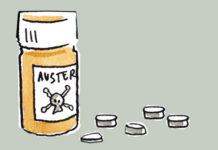“Making a Silk Purse Out of a Sow’s Ear”: Erick Turner on How Publication...
Ayurdhi Dhar interviews Erick Turner about publication bias in antidepressant trials, compromised psychotherapeutic research, and a culture of journal worship.
Moving Global Mental Health “Outside Our Heads”
On MIA Radio we interview Dr. Derek Summerfield, honorary senior lecturer at the Institute of Psychiatry in London, former Research Associate at the Refugee Studies Centre at the University of Oxford and consultant at Oxfam.
Constructing Alternatives to the DSM: An Interview with Dr. Jonathan Raskin
Dr. Raskin discusses psychotherapists’ dissatisfaction with current psychiatric diagnostic systems and explores alternatives.
Mental Health and Emotion in the Digital Age: An Interview with Ian Tucker
MIA's Tim Beck interviews psychologist Ian Tucker about the relationships between digital technologies, emotion, and mental health.
The Social Unconscious and Character Formation in Neoliberal Culture: An Interview with Lynne Layton
MIA’s Javier Rizo interviews Lynne Layton about social psychoanalysis and how normative unconscious processes can help illuminate how oppressive systems get internalized and reproduced.
Can Critiques of Psychiatry Help us Imagine a Post-Capitalist Future? An Interview with Hans...
An interview with Hans Skott-Myhre on the seeds of post-capitalist subjectivity to be found in the writing of Franco Basaglia and R.D. Laing.
The Creation of a Conceptual Alternative to the DSM: An Interview with Dr. Lucy...
MIA's Zenobia Morrill interviews Lucy Johnstone about the reaction to the Power Threat Meaning Framework, her life influences, and her hopes for the future.
No Link Between Serotonin and Depression: What Does That Mean for Antidepressants?
Peter Simons covers in detail a new systematic review that debunks the widely popularized myth of low serotonin in depression, the “chemical imbalance theory.”
MDMA Assisted Psychotherapy and Therapeutic Humility: An Interview with Marcela Ot’alora
Richard Sears interviews Marcella Ot’alora, therapist and principal investigator for MAPS MDMA-assisted psychotherapy.
Opening Doors in the Borderlands: An Interview with Liberation Psychologist Mary Watkins
MIA’s Micah Ingle interviews Mary Watkins about reorienting psychology toward liberation and social justice.
Looking Beyond Self-Help to Understand Resilience: An Interview with Michael Ungar
Ayurdhi Dhar interviews Michael Ungar about how complex systems make us vulnerable and how resilience emerges in context-specific ways.
Unscientific Diagnoses Medicalize Normal Human Experiences
In this 30-minute podcast, Peter Simons reports on the latest scientific articles in psychiatry.
Can Psychosocial Disability Transform Mental Health? A Conversation with Luis Arroyo and Justin Karter
Mad in Mexico's Luis Arroyo interviews MIA's Justin Karter about how psychosocial disability inclusion can transform Global Mental Health.
Why Psychosis Is Not So Crazy: A Conversation with Stijn Vanheule
Vanheule urges clinicians to listen for the structure in psychotic thought. He offers clinical examples that reframe hallucinations as a form of creative response to unspeakable dilemmas.
Undisclosed Financial Conflicts of Interest in the DSM-5: An Interview with Lisa Cosgrove and...
On the Mad in America podcast we talk with Lisa Cosgrove and Brian Piper about their BMJ paper entitled "Undisclosed Financial Conflicts of Interest in the DSM-5 TR: Cross-Sectional Analysis"
Toward a Critical Self-Reflective Psychiatry: An Interview with Pat Bracken
MIA’s Justin Karter interviews critical psychiatrist and philosopher Pat Bracken about the necessity of challenging received wisdom.
Questioning the Moral Panic Around Teletherapy: An Interview with Hannah Zeavin
MIA's Emaline Friedman interviews Hannah Zeavin about what the history of teletherapy reveals about its limitations and radical potential.
Where Western Medicine Meets Indigenous Healing: An Interview with Anthropologist Ian Puppe
MIA's Micah Ingle interviews the anthropologist Ian Puppe on how the imposition of psychiatric treatments can lead to harmful iatrogenic effects with Indigenous peoples.
Chemically Imbalanced: Joanna Moncrieff on the Making and Unmaking of the Serotonin Myth
Joanna Moncrieff joins Robert Whitaker to talk about her latest book, titled Chemically Imbalanced: The Making and Unmaking of the Serotonin Myth. They discuss the serotonin story and the fact that there is no good evidence that a serotonergic deficiency is a primary cause of depression.
Poverty, Pathology and Pills: An Interview with Dr. Felicity Thomas and Dr. Richard Byng
MIA’s Tim Beck interviews Dr. Felicity Thomas and Dr. Richard Byng about their report, Poverty, Pathology, and Pills, which situates increasing rates of mental health diagnosis and psychiatric prescriptions within socioeconomic and policy trends across the UK.
False Positives in Brain Imaging, Unpublished and Missing Trials, and Conflicts of Interest
In our Science News podcast, Peter Simons reports on false positives in brain imaging, unpublished and missing trials, conflicts of interest and more.
How Culture Influences Voice Hearing: An Interview with Stanford Anthropologist Tanya Luhrmann
Ayurdhi Dhar interviews Tanya Luhrmann about cultural differences in voice-hearing, diagnosis and damaged identities, and conflicts in psychiatry.
Our Medical System Protects Wrongdoers and Punishes Whistleblowers: An Interview with Carl Elliott
MIA’s Ayurdhi Dhar interviews Carl Elliott about scandals in psychiatry and the challenges faced by whistleblowers.
Rights Based Global Mental Health and Social Exclusion: An Interview with Ursula Read
MIA interviews the anthropologist Ursula Read about her research on mental illness, human rights, and social exclusion in Ghana.
The Radical Politics of Madness: An Interview with Micha Frazer-Carroll
MIA's Justin Karter interviews Micha Frazer-Carroll about her new book, "Mad World: The Politics of Mental Health."

































